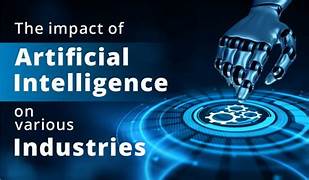How Will Advancements in AI Impact Job Security Across Different Sectors?
Artificial intelligence (AI) is no longer a distant dream—it is a tangible reality reshaping industries, economies, and societies worldwide. From automating repetitive tasks to enabling predictive analytics, AI has the potential to enhance productivity and innovation. However, its rapid adoption also raises pressing questions about job security across different sectors. While AI may create opportunities in some areas, it also poses a significant risk of job displacement in others. This article explores the multifaceted impact of AI on job security, delving into the opportunities, challenges, and potential solutions to navigate the evolving employment landscape.
The Dual Nature of AI’s Impact on Jobs
AI’s influence on employment can be understood through two key dimensions: automation and augmentation.
- Automation
Automation involves AI replacing human labor in tasks that are repetitive, predictable, and rule-based. Jobs in manufacturing, data entry, and retail, for instance, are highly susceptible to automation. - Augmentation
In contrast, augmentation refers to AI enhancing human capabilities rather than replacing them. Professionals in fields like medicine, engineering, and marketing may find their productivity significantly boosted by AI tools.
This dual nature of AI means that while some jobs will become obsolete, others will evolve, requiring workers to adapt and reskill.
Sectors Most Affected by AI
1. Manufacturing
The manufacturing sector has long been at the forefront of automation. Robotic arms and automated assembly lines powered by AI have replaced human workers in tasks requiring precision and speed.
- Impact: Jobs such as machine operators and assembly line workers are at high risk of displacement.
- Opportunities: AI also creates demand for roles in robotics maintenance, AI system management, and quality control.
2. Retail and Customer Service
AI-driven chatbots, virtual assistants, and self-checkout systems are transforming the retail and customer service sectors.
- Impact: Roles like cashiers and customer service representatives are increasingly being automated.
- Opportunities: Jobs involving customer relationship management, personalized marketing, and AI system oversight are emerging.
3. Healthcare
AI is revolutionizing healthcare through diagnostic tools, predictive analytics, and robotic surgery.
- Impact: Administrative roles, such as medical billing and scheduling, face automation.
- Opportunities: Demand for AI-enhanced roles like data analysts, bioinformaticians, and AI-trained clinicians is on the rise.
4. Transportation and Logistics
Autonomous vehicles and AI-powered logistics platforms are reshaping the transportation and logistics sectors.
- Impact: Truck drivers, delivery personnel, and warehouse workers face job displacement risks.
- Opportunities: The development and maintenance of AI systems, as well as roles in fleet management, are growing fields.
5. Finance and Banking
AI applications in finance include algorithmic trading, fraud detection, and automated customer support.
- Impact: Jobs like loan officers, tellers, and compliance analysts may be reduced.
- Opportunities: Roles in AI development, financial analytics, and cybersecurity are expanding.
6. Education
AI-powered personalized learning platforms and virtual tutors are reshaping the education landscape.
- Impact: Traditional teaching methods and administrative roles could see a decline.
- Opportunities: Teachers who adapt to AI tools and focus on mentorship and creativity will remain essential.
The Opportunities AI Presents
While AI poses challenges, it also creates opportunities that can transform the workforce:
- New Job Roles
- AI development and programming require skilled professionals.
- Data analysts and scientists are in high demand to interpret the vast data generated by AI systems.
- Improved Productivity
- AI augments human capabilities, allowing professionals to focus on higher-value tasks. For example, lawyers can use AI for legal research, enabling them to concentrate on strategy and argumentation.
- Entrepreneurial Opportunities
- AI-driven innovations open avenues for entrepreneurs to create new products, services, and business models.
- Reskilling and Upskilling
- The need for workers to adapt creates opportunities for lifelong learning and skill development, particularly in fields like AI ethics, machine learning, and human-AI collaboration.
Challenges to Job Security
Despite its benefits, AI poses several challenges to job security:
- Skill Gaps
Workers without advanced technical skills may struggle to find employment in an AI-driven economy. - Economic Inequality
Automation disproportionately affects low-skilled jobs, exacerbating income inequality and economic disparities. - Job Displacement
Entire industries could face significant disruption, with millions of workers needing to transition to new roles or sectors. - Ethical Concerns
AI algorithms can perpetuate biases, leading to unfair hiring practices and workplace decisions. - Psychological Impact
The uncertainty surrounding AI-driven changes can create stress and anxiety among workers, affecting mental health and workplace morale.
Strategies to Mitigate the Impact of AI on Job Security
Governments, businesses, and educational institutions must collaborate to address the challenges posed by AI. Key strategies include:
1. Reskilling and Upskilling Programs
- Initiatives: Governments and companies should invest in training programs to help workers acquire new skills.
- Focus Areas: Courses in AI, machine learning, data analytics, and digital literacy can empower workers to transition to new roles.
2. Education Reform
- STEM Education: Emphasizing science, technology, engineering, and mathematics can prepare future generations for AI-driven industries.
- Soft Skills: Developing creativity, critical thinking, and emotional intelligence will be crucial in roles where human capabilities complement AI.
3. Universal Basic Income (UBI)
- UBI can provide a financial safety net for workers displaced by automation, allowing them to pursue new opportunities without economic hardship.
4. Ethical AI Practices
- Transparency: AI systems should be designed to ensure transparency and accountability.
- Inclusivity: Efforts must be made to mitigate biases in AI algorithms, ensuring fair outcomes for all.
5. Support for Vulnerable Workers
- Targeted initiatives to assist workers in sectors most affected by AI, such as manufacturing and retail, can help mitigate job losses.
The Long-Term Outlook
The impact of AI on job security is complex and multifaceted. In the short term, certain sectors will face significant disruptions, and workers will need to adapt to survive in an AI-driven economy. However, in the long term, AI has the potential to create a more dynamic and innovative job market.
With proactive measures and collaborative efforts, society can harness the transformative power of AI while minimizing its risks. By prioritizing education, ethical practices, and social safety nets, we can build a future where AI enhances human potential rather than undermines it.
Conclusion
Advancements in AI are poised to reshape the workforce in profound ways. While some sectors will experience job displacement due to automation, others will thrive with the creation of new roles and opportunities. The challenge lies in navigating this transition responsibly, ensuring that workers are equipped to adapt to the changes ahead.
By investing in education, reskilling, and ethical practices, we can leverage AI as a force for good, fostering innovation, productivity, and economic growth. In doing so, we can ensure that the benefits of AI are shared equitably, creating a future where technology and humanity coexist harmoniously.


